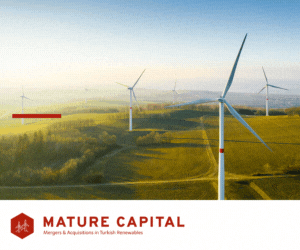Genel
TWEA: The uniting power of Türkiye wind energy

Turkish Wind Energy Association (TWEA), as the most powerful non-governmental sector association in wind energy in Turkey with a past longing to 30 years, acting together with the public institutions and industry partners, forms a common mind in wind energy. İbrahim Erden, the Chairman of TWEA, with whom we’ve made an interview on global energy crisis, dissolution of the dire straits in energy and the recent situation of wind energy in Turkey, has evaluated the up-to-date developments in the industry for Rüzgar Enerjisi Magazine.
Could you give general information about TWEA, which plays an important role for Turkey’s wind energy sector, and give information about the activities you carry out as an association?
Turkish Wind Energy Association (TWEA), with its 30-year history, is the most comprehensive umbrella organization of the wind industry in our country. TWEA was established to follow scientific, technical and applied research on wind energy, to carry out activities to popularize the use of wind energy resources, and to bring the wind potential in our country to the economy. The activities we carry out as an association mainly focus on the following areas:
• Development of the sector,
• Overcoming obstacles to investors and improving the investment climate,
• Making legal arrangements by considering sector expectations,
• The competition of our industry and hereby the increase in export power,
• Transferring more resources to R&D activities and trained manpower,
• With the strength and experience, our country has in the field of wind energy, both attracting international investors to our country and enabling this strength to be used in other countries.
The whole world is looking for ways to deal with the energy crisis. Could you interpret this global crisis that affects the consumer and producer separately? Where is Turkey’s position in this crisis?
Unfortunately, the current crisis is too broad to be summarized in a single sentence. We are experiencing an energy crisis set off by Russia’s invasion of Ukraine, exploding primarily with the restrictions imposed on Russia, which has a great weight in the supply of natural gas, but also oil and coal. With the increase in electricity prices as a result of the restrictions in these primary energy sources and the increased prices, the increasing costs in the entire value chain have caused inflation and contraction in supply in all areas. Lately we hear that, large chemistry, iron and steel, ceramics, etc., have stopped their production due to high electricity prices. These developments continue to cause more problems in a chain.
This shrinking, which emerged after the COVID pandemic, and especially the disruptions in the supply chain stretching from the far east to the west, as well as the economic problems affecting the whole world, actually deepened with the energy crisis experienced by Russia’s invasion of Ukraine. It seems that the world economy will not be able to survive this troubled period for another 1-2 years; Our country is also trying to take a position in the right place in this situation. However, due to the economic problems from the past, we are also experiencing inflation and similar economic issues in this regard. Everyone, including developed countries, experiences economic fluctuation to varying degrees. Growth rates are either negligible or negative in many countries. However, the aim of every country is to grow; but growth requires a constant supply of energy. Energy supply security is currently under a serious threat. The answer that will relieve countries in this crisis is the adequacy of using renewable resources as well as storage technologies to the maximum extent. At this point, we are all affected by this global crisis, both on the basis of the final consumer and the producer. On the one hand, the costs of the producer are increasing at unexpected rates; and on the other, the bills we pay as consumers are increasing. To find a solution to this crisis in the near or medium term, we have to build more renewable energy capacity. It is essential that a country like Turkey, which has very rich resources in terms of both wind and solar, regularly increases its capacity in this field and provides a more stable environment that investors need. If we have exceeded 12 thousand MW installed power in wind today, we owe this to the determination of the decision makers and the willingness of the investors to turn to this field. Maintaining this haste is also essential in terms of preserving the gains we have made on behalf of our country.
Considering of our country, could wind, Turkey’s rising energy source, be the key to this energy crisis? What are the barriers and opportunities in the industry? What steps should be taken to use the potential?
Wind energy can very easily be one of the key steps to this crisis. Our wind industry is quite strong. Moreover, we have reached this strength in a very short time like a decade. Our investors are experienced, we have large resource areas for new wind projects, and we also have trained labor force at hand! Now we need to use this for the benefit of our country to the maximum extent possible. In this way, we can go a long way in overcoming this crisis in the coming years. We all know that investment environments demand greater predictability so that consistent planning and accurate calculations can be made. The more stable your structure and functioning in areas such as permit processes, support mechanisms, as well as other relevant legal regulations, the more consistent your financial feasibility would be. Moreover, you will attract more investors in this direction. In addition, regular capacity announcements for investors are also an important part of more accurate results. Therefore, as in almost all sectors, we believe that every new regulation that will be made by taking into account the expectations of the sector and in accordance with the requirements of the day will strengthen our hand as a country in terms of supply security in the global energy crisis, which we are also affected by.
In addition to the energy crisis, we are facing a climate crisis that threatens more and more lives every year. NGOs emphasize that in order for Turkey to reach its 2053 net zero target, its emissions must be reduced by 35% by 2030. In the light of these facts, how should be Turkey’s path in wind Energy?
To give a clear answer to this question: The Turkish wind industry has the capacity to realize at least 3,000 MW of installed power every year; this is a marvelous strength for our country. We can predict that our wind installed power will exceed 30 GW by 2030, if we announce at least 3,000 MW of capacity for each year starting from 2023, and if we can quickly implement the legal or administrative regulations in line with the requirements of the day. This is a tremendous contribution to achieving climate targets. Of course, it is not only the wind that will grow with such an approach, our solar energy installed capacity will also increase. Therefore, we believe that it is necessary to set a target, determine a road map, and turn the interest in renewable energy into investment. In this way, it will be possible to reduce carbon emissions with more renewable energy facilities that will be put into operation, and it will be inevitable that we focus more on new technologies such as storage technologies, hybrid technologies and hydrogen production.
Could you evaluate the position of Europe and Turkey in the realization of decarbonization targets?
This is an issue that Europe takes so seriously. Within the framework of the EU Green Deal, ‘border carbon tax’ applications will gradually start from next year. Europe is our biggest export partner. We should see this and similar practices not as a threat, but an opportunity; both because of our environmental responsibility and the opportunity to set an example in this regard as a country with a strong industry. These regulations also set clear targets for Turkey on the way to ‘transition to a low-carbon economy’. When we look at the industry, we see that steps have been taken in this direction, which is very gratifying for us as investors and citizens.
How do you evaluate the complaints made by international wind organizations in recent years that national and international companies in wind projects in Turkey can progress slowly in the licensing processes, permits and other approval processes of the projects and the related processes take time? Have new legal regulations been made on this subject, can you give information about these regulations?
The requirement to obtain permission from many different institutions, sometimes as much as 30, while implementing complex projects, can indeed cause serious delays in terms of both time and financial projections. This actually means that our country’s resources are not used efficiently enough. Therefore, as TWEA, we spend a lot of time in this field. We hope that the regulations made by our Ministry and EPDK (Energy Market Regulatory Authority) will shorten the project development, permission and approval processes. On the other hand, I would like to point out that even in European countries or the USA, investment processes go through similar courses and can take long periods.
Offshore wind energy is among the main agenda items of wind. Could you make an evaluation of Turkey’s offshore wind potential, which experts often draw attention to?
Offshore wind is an issue that we, as TWEA, embrace and work in unity. Turkey does not yet have an official potential study in this area, but the estimates included in the studies made by some global institutions draw attention to the potential of around 20 thousand MWs. The studies carried out by the relevant experts, who are our members, also foresee a capacity at this minimum level. Of course, this is a serious potential, and it may rise even higher in the future with the developments in turbine technology. However, thanks to the developing technologies, it is a priority for our country to invest our potential, which exceeds 100 thousand MW, primarily in the onshore field as much as possible. Of course, this does not mean that we should not use our offshore potential! However, in order to return to investment, first of all, measurements and other critical project development steps that investors can base on in this field must be completed. For this reason, we can say we are contented that our relevant institutions are giving weight to their studies and that they are in contact with us.
-

 Events5 years ago
Events5 years agoCanada and Turkey women working in the renewable energy sector in met
-

 Manufacturers of wind turbines5 years ago
Manufacturers of wind turbines5 years agoGE’s Haliade-X 12 MW prototype to be installed in Rotterdam
-

 Operations and Maintenance6 years ago
Operations and Maintenance6 years agoGENBA is on the rise; another milestone passed by in global existence
-

 Genel9 years ago
Genel9 years agoEWT launches the DW61, It’s most efficient and high energy producing wind turbine
-

 Genel9 years ago
Genel9 years agoInternet of things will empower the wind energy power plants
-

 Turbine Manufacturing6 years ago
Turbine Manufacturing6 years agoİğrek Makina focused on developing and producing Machine Tools and Wind Energy Turbines
-

 Energy management systems5 years ago
Energy management systems5 years agoDemand/Supply – Renewable energy with guarantees of origin (GO)
-

 Events5 years ago
Events5 years agoKey Players from 10 Nations will Show Their Strong Positions at APWEE
-

 Manufacturers of wind turbines4 years ago
Manufacturers of wind turbines4 years agoENERCON installs E-160 EP5 prototype
-

 Manufacturers of wind turbines5 years ago
Manufacturers of wind turbines5 years agoThe Nordex Group receives first order for Delta4000 turbines from the USA
-

 Genel8 years ago
Genel8 years agoZorlu energy envisages a bold new future based on renewables
-

 Manufacturers of wind turbines6 years ago
Manufacturers of wind turbines6 years agoENERCON and Lagerwey together develop two new WEC types





